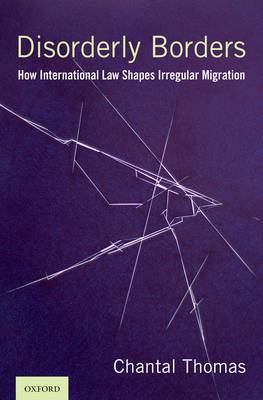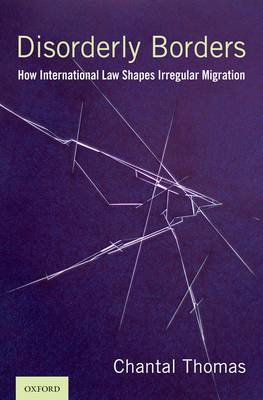
En raison d'une grêve chez bpost, votre commande pourrait être retardée. Vous avez besoin d’un livre rapidement ? Nos magasins vous accueillent à bras ouverts !
- Retrait gratuit dans votre magasin Club
- 7.000.000 titres dans notre catalogue
- Payer en toute sécurité
- Toujours un magasin près de chez vous
En raison de la grêve chez bpost, votre commande pourrait être retardée. Vous avez besoin d’un livre rapidement ? Nos magasins vous accueillent à bras ouverts !
- Retrait gratuit dans votre magasin Club
- 7.000.0000 titres dans notre catalogue
- Payer en toute sécurité
- Toujours un magasin près de chez vous
Disorderly Borders
How International Law Shapes Irregular Migration
Chantal Thomas
Livre relié | Anglais
84,45 €
+ 168 points
Description
Immigration crises faced by the United States today show the interplay between areas of global law and policy that might at first glance seem quite disparate--economic law, human rights and refugee law, and criminal law relating to the trafficking and smuggling of migrants. This book is largely dedicated to unpacking those dynamics and ultimately argues that reform efforts must be expanded. Using as a central case study how international law relates to the irregular labor migration of undocumented migrant farm workers in upstate New York, this book examines the conditions for entry of these workers, for their residence and work while in the US, and finally what happens if they are apprehended and subject to expulsion. The author aims to show that the presence of these migrants can be significantly attributed to dynamics flowing from international economic law, and that the interaction of international economic law with international human rights, refugee, labor and criminal law in defining their legal rights and remedies is often incoherent. As such, this wave of irregular migration might be seen as the product of a "perfect storm" in international law: a vexed and unstable relationship between disparate regimes that propels dynamic population movements without just and orderly means of protection.
Spécifications
Parties prenantes
- Auteur(s) :
- Editeur:
Contenu
- Nombre de pages :
- 368
- Langue:
- Anglais
Caractéristiques
- EAN:
- 9780190908775
- Date de parution :
- 22-04-22
- Format:
- Livre relié
- Format numérique:
- Genaaid
- Dimensions :
- 3 mm x 3 mm
- Poids :
- 4 g

Les avis
Nous publions uniquement les avis qui respectent les conditions requises. Consultez nos conditions pour les avis.






